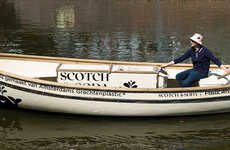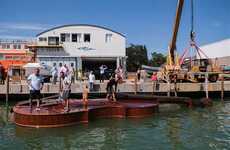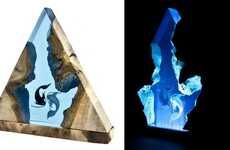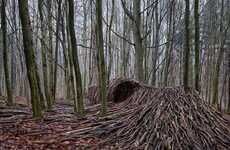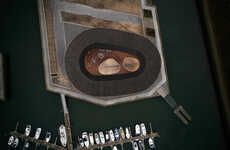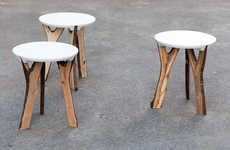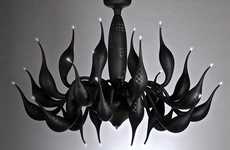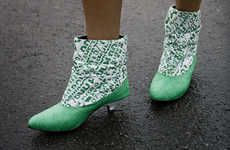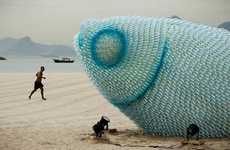
David Kemp's 'Wooden Whaler' is Made of Two Discarded Boats
Laura McQuarrie — June 11, 2013 — Eco
References: davidkemp.uk & recyclart.org
This recycled artwork by David Kemp was created with two abandoned cove boats and the help of two friendly fisherman. Kemp notes that the popularity of catching fish with "clinker boats and cove fishing" is rapidly declining in Cornwall.
The 'Wooden Whaler' seems to prove that, as the two boats that make up this sculpture were discarded. With the addition of just a few more pieces of driftwood, this sculpture was complete. Kemp used the boats to form the top and bottom halves of the large whale, creating a gigantic piece of recycled art on the seashore.
The boat's curved forms, lines and coloring is reminiscent of Native American art. It is a brilliant way to reuse the discarded boats and pay tribute to the beauty of sea life.
The 'Wooden Whaler' seems to prove that, as the two boats that make up this sculpture were discarded. With the addition of just a few more pieces of driftwood, this sculpture was complete. Kemp used the boats to form the top and bottom halves of the large whale, creating a gigantic piece of recycled art on the seashore.
The boat's curved forms, lines and coloring is reminiscent of Native American art. It is a brilliant way to reuse the discarded boats and pay tribute to the beauty of sea life.
Trend Themes
1. Recycled Art - Creating artwork using discarded materials, such as boats, is a disruptive innovation opportunity to promote sustainability.
2. Decline of Traditional Fishing - The declining popularity of clinker boats and cove fishing presents a disruptive innovation opportunity to develop alternative fishing methods.
3. Environmental Awareness - The use of driftwood and discarded boats in art highlights the importance of environmental conservation and presents an opportunity for innovative eco-friendly solutions.
Industry Implications
1. Art and Design - The art and design industry can embrace recycled materials to create unique and sustainable artworks, opening up new markets and attracting environmentally conscious consumers.
2. Fishing and Marine - The fishing and marine industry can explore alternative fishing methods and technologies to adapt to the declining popularity of traditional fishing practices.
3. Environmental Conservation - The environmental conservation industry can leverage recycled materials and art to raise awareness about ocean pollution and the importance of recycling.
3.1
Score
Popularity
Activity
Freshness



